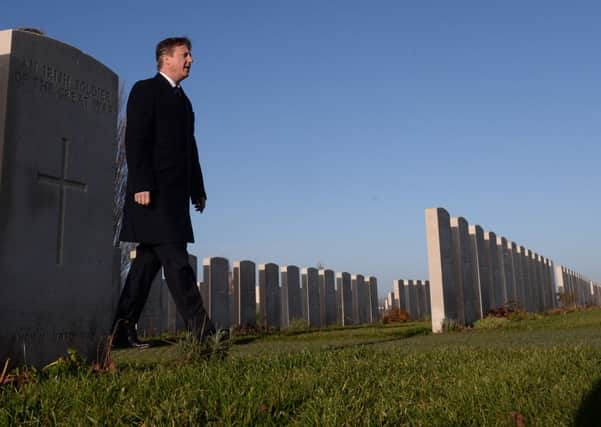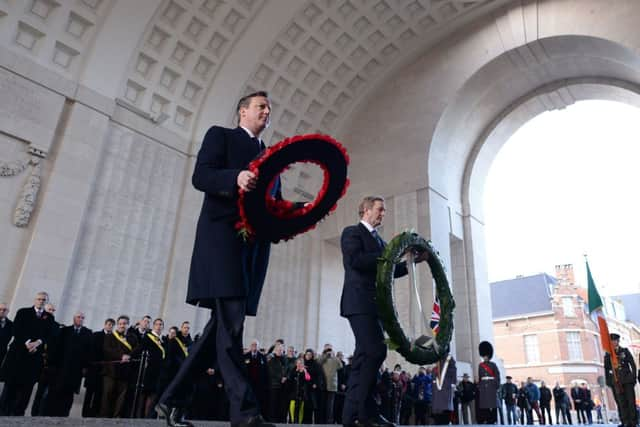The lonely grave: Cameron and Kenny in moving WW1 tribute


The British Prime Minister and Irish Taoiseach paid their respects at sites across Flanders in Belgium in what the Irish Government described as the latest “key milestone” in deepening British-Irish relations.
In a poignant moment, they laid wreaths at the grave of Irish nationalist William Redmond.
Advertisement
Hide AdAdvertisement
Hide AdKnown as the “lonely grave” after he requested to be buried outside the British military cemetery at Locre in response to the Easter Rising executions, the site is seen as an emblem of the alienation Irish Catholics felt from their countrymen at that time.


Captain Redmond died aged 56 after going over the top in the 1917 battle of Messines.
The visit was part of the decade of centenary commemorations of key events between 2012 and 2022.
Announcing the joint visit last month, Mr Kenny said that following the Queen’s historic visit to Dublin in 2011, he and Mr Cameron had been keen to mark the sacrifice of those killed, missing or injured on the battlefield.
Advertisement
Hide AdAdvertisement
Hide AdWriting in The Daily Telegraph today, Mr Cameron described the sacrifice of his great, great uncle Captain John Geddes who died in the second battle at Ypres in 1915.
He was the first of five members of the Prime Minister’s family to be killed in the war.
Mr Cameron wrote: “Like many across Britain, I feel a strong connection with all the members of my family who gave their lives in the war.”
Their trip began at the Island of Ireland Peace Park at Messines, a memorial to the 50,000 Irish war dead who fought in British uniform in an era of heightened tension at home.
Advertisement
Hide AdAdvertisement
Hide AdBoth laid wreaths, with Mr Kenny’s reading “In honour of all those who died” in Gaelic and English.
The men surveyed the former battlefield including a site of the Boxing Day truce football match.
After stopping at Captain Redmond’s grave, they visited the village of Wytschaete, where the 16th (Dublin) and 36th (Ulster) divisions advanced together in the bloody 1917 Messines Ridge offensive.
They met Belgian prime minister Elio Di Rupo at the Menin Gate Memorial, dedicated to British and Commonwealth soldiers whose graves are unknown.
Advertisement
Hide AdAdvertisement
Hide AdThe tour finished at Tyne Cot Cemetery, the largest cemetery for Commonwealth forces in the world where Mr Cameron met children from the Pent Valley Technology College in Folkestone.
Mr Cameron used the visit to announce £5 million in new funding to help conserve, repair and protect First World War memorials and graves across the UK and overseas where British and Commonwealth servicemen and women are buried.
The extra money, funded by Libor fines and spread over the four years of the First World War centenary, will also fund new educational materials.
The Prime Minister said: “Next year’s centenary of the start of the First World War will be a time for the whole nation to reflect on the events that saw so many young people of that generation make the ultimate sacrifice.
Advertisement
Hide AdAdvertisement
Hide Ad“Nearly all of us in Britain have some family connection with that conflict, and it is the many millions of small, personal stories that resonate as loudly for us as the big, world-changing battles and campaigns.
“As part of that, it is absolutely right that we help communities up and down the country to ensure that their local war memorials are a fitting tribute to the fallen and increase people’s understanding of what happened.
“We simply should not tolerate damaged war graves in our country.”